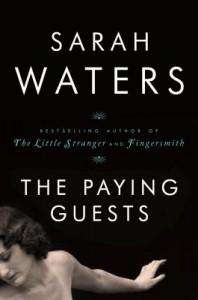Title: The Paying Guests
Author: Sarah Waters
ISBN: 9781594633119
No. of Pages: 576
Genre: Historical Fiction
Origins: Riverhead Books
Release Date: 16 September 2014
Bottom Line: Not her best
 Synopsis:
Synopsis:
“It is 1922, and London is tense. Ex-servicemen are disillusioned; the out-of-work and the hungry are demanding change. And in South London, in a genteel Camberwell villa—a large, silent house now bereft of brothers, husband, and even servants—life is about to be transformed as impoverished widow Mrs. Wray and her spinster daughter, Frances, are obliged to take in lodgers.
With the arrival of Lilian and Leonard Barber, a modern young couple of the “clerk class,” the routines of the house will be shaken up in unexpected ways. Little do the Wrays know just how profoundly their new tenants will alter the course of Frances’s life—or, as passions mount and frustration gathers, how far-reaching, and how devastating, the disturbances will be.
Short-listed for the Man Booker Prize three times, Sarah Waters has earned a reputation as one of our greatest writers of historical fiction, and here she has delivered again. A love story, a tension-filled crime story, and a beautifully atmospheric portrait of a fascinating time and place, The Paying Guests is Sarah Waters’s finest achievement yet.”
Thoughts: In The Paying Guests, Ms. Waters ditches all mentions of the supernatural and hints of the otherworldly in favor of crime fiction with a little history and a whole lot of unconventional love story thrown into the mix. The story itself tends to meander slowly through Frances’ world, exposing readers to her self-established limitations and subsequent frustrations. The historical elements of post-war London are nothing more than a backdrop as Frances works through her issues as a landlady and as one of the last two remaining family members. The love story tends to be the focal point of the story, as it simultaneously spotlights Frances’ differences among a world that is trying to keep its traditions and rigid social customs and is also the origination point of the crime story aspect.
While it appears as if there is a lot going on within The Paying Guests, in reality the story is very ponderous and even sometimes boring. There are a lot of pages devoted to Frances’ confusion about her relationship with Lilian or the many regrets in her life. When the story finally gains traction and interest starts to build that some sort of action will occur, it quickly stutters to a halt as the novel devolves into yet more hand-wringing and anxiety-laden nights. Frances loses what little sympathy she generates as she continues to remain passive when there is nothing passive about her.
One could consider Frances to be nothing more than a product of her times. The types of relationships for which she yearns and the kind of life she wants to lead are not acceptable in society, and as the sole caretaker of her mother and the family house/land, it is especially important she remain within societal constraints. However, as Frances reminisces about her past behaviors, readers realize that docility is not her forte. In fact, much of her angst revolves around her chafing at the constraints to which she bound herself rather than living the life she wants to live. The disconnect between how she acts and who she is should be a point of interest within the story. Instead, it is merely a frustration for readers that this strong-willed and independence-minded woman chooses to bind herself so tightly to the past.
Granted, the story does take place during a time when large family estates were rapidly disappearing and society was moving towards a less formal, more egalitarian society – as much as Britain will ever be one, and Frances does embody this tension. However, outside of Frances, no other mention of such tensions occur. There is plenty of passing talk about homeless veterans and the tough times that befell almost all servicemen upon returning home from the war, but the talk is limited to generalities. There is no close examination or even political discussion of the changing times. The trial may be the closest a reader will ever get to a window into the debate, but even that is just background noise to Frances’ and Lilian’s growing agitation and compounding fear and guilt.
When all is said and done, The Paying Guests is a disappointment. Readers who are fans of Ms. Waters’ previous novels will miss the little Gothic touches she typically adds to her stories. The amount of words and space devoted to microscopic examinations of Frances’ feelings and resentments stultifies the story, and there is a distinct lost opportunity to explore the political, economic, and social changes occurring in and around London after World War I. The crime adds only minor excitement to a novel that tends towards the pedantic. The tensions between past and present, old and young, are interesting but not nearly enough to redeem the entire story.
